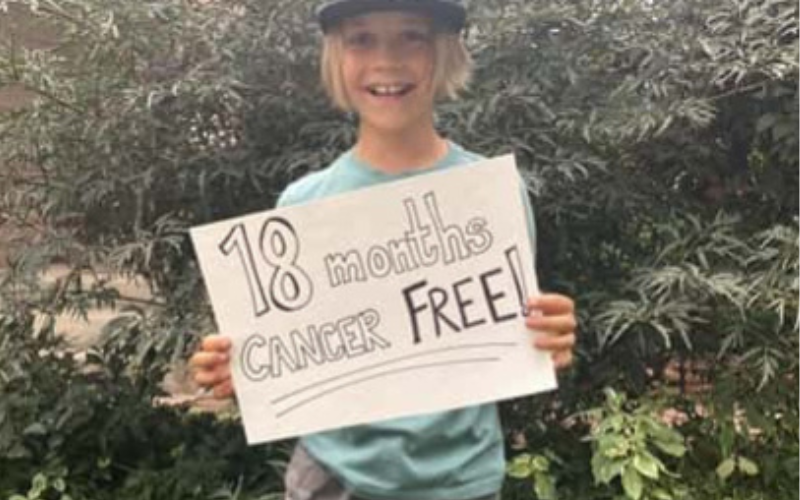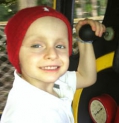
When Beaudin’s leukemia relapsed, a CAR T clinical trial in Philadelphia gave the family hope. The only problem: Beaudin lived in Denver. ALSF provided the family with travel support through the Travel For Care program. The treatment worked — today, Beaudin is cancer-free.
By: Trish Adkins
T-cells, a specialized type of white cell, are a powerful force against viruses and bacteria. But cancer has eluded their detection — until now.
When you are sick with a virus or infection, the immune system goes to work identifying the foreign invader and killing it. Each part of the immune system has a job. The lymph nodes and bone marrow deploy white blood cells to the battle. At the front line, T-cells immediately jump into the fight, replicating over and over again, until the invader is defeated.
These powerful cells are tiny. T-cells measure just eight-to-10 microns in diameter (which is somewhere between the width of a spider web and the diameter of a rain droplet). For something so small, they pack a powerful punch. They store memories of the foreign interlopers so future invasions can be squashed without hesitation.
However, when the foreign invaders are cancer cells, T-cells are missing from the action. Left with free rein, cancer creates commotion and wreckage in the body, growing rapidly and invasively without T-cells stopping it. The problem is complicated — cancer cells are mutated cells of the body, not exactly foreign invaders, and they have their own cloaking mechanisms to hide in plain sight.
What’s a T-cell to do if it doesn’t know a threat is even there? How can all that potential T-cell power be harnessed to stop cancer? The answer is CAR T therapy.
CAR T therapy is a cutting-edge treatment that has shown promise for the treatment of a variety of adult and pediatric cancers. Alex’s Lemonade Stand Foundation (ALSF) began funding early CAR T studies over 10 years ago. To date, ALSF has funded nearly 30 different projects studying this specialized therapy.
The CAR in CAR T stands for chimeric antigen receptor. Chimeric comes from the Chimera, a strange mixed-up beast from Greek mythology made up of a lion, a goat and a serpent. In the case of CAR T, the chimeric represents a protein made in the lab (the CAR) that is placed on a T-cell, allowing it to see and know how to kill cancer in the body.
This special protein isn’t placed on top of just any T-cell. CAR T therapy is customized for each patient. First, a patient’s T-cells are harvested, then those T-cells are altered with CAR, and lastly, the brand new T-cells are returned to the patient to kill the cancer — going from zero to hero in a few (complicated) steps.
The treatment holds a lot of promise because it works. Cancer cells disappear.
The FDA approved CAR T as treatment for certain types of leukemia in 2017. But FDA approval does not mean the end of research.
ALSF funds several grants that study the potential of CAR T immunotherapy for all different types of childhood cancer, including a study at Stanford University led by Dr. Michelle Monje studying CAR T for the deadly brain tumor, DIPG. The Foundation also supports the infrastructure of CAR T clinical trials through its Center of Excellence grant programs at Children’s Hospital of Philadelphia, Texas Children’s Hospital, Dana-Farber Cancer Institute and the University of California San Francisco.
Since CAR T therapy is only available at highly specialized, FDA-authorized institutions, access can be a challenge for families. The treatment might not be available close to home, even if a larger pediatric oncology hospital is nearby. In this case, ALSF offers families access to funds for travel through its Travel For Care program. In 2022, Travel For Care helped more than 350 families reach specialized treatments.

